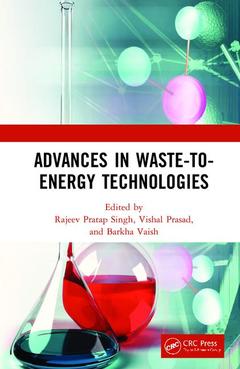Advances in Waste-to-Energy Technologies
Coordonnateurs : Singh Rajeev, Prasad Vishal, Vaish Barkha

As global populations continue to increase, the application of biotechnological processes for disposal and control of waste has gained importance in recent years. Advances in Waste-to-Energy Technologies presents the latest developments in the areas of solid waste management, Waste-to-Energy (WTE) technologies, biotechnological approaches, and their global challenges. It combines biotechnological procedures, sophisticated modeling, and techno-economic analysis of waste, and examines the current need for the maximum recovery of energy from wastes as well as the associated biotechnological and environmental impacts.
Features:
- Presents numerous waste management practices and methods to recover resources from waste using the best biotechnological approaches available.
- Addresses the challenges, management, and policy issues of waste management and WTE initiatives.
- Includes practical case studies from around the world.
- Serves as a useful resource for professionals and students involved in cross-disciplinary and trans-disciplinary research programs and related courses.
- Discusses the economic and regulatory contexts for managing waste.
This book will serve as a valuable reference for researchers, academicians, municipal authorities, government bodies, waste managers, building engineers, and environmental consultants requiring an understanding of waste management and the latest WTE technologies.
1. Solid waste: Characterization, Assessment, Monitoring, and Remediation. 2. Issues and Challenges in Sustainable Solid Waste Management: Global and Asian Perspective. 3. Cairo's Zabaleen Garbage Collectors: Sustainable Practices and the Right to Waste Resources. 4. Municipal Solid Waste Management in Two Cities of Palestine: A Comparative Study. 5. 3E ( Energy, Economic, and Environmental) Analysis of Waste Management Strategies. 6. Biological Treatment of Waste: An Overview. 7. Biological Systems of Waste Management and Treatment. 8. Biogas Potential From Cabbage and Lettuce Residuals: Effect of Organic Load and Co-digestion. 9. Hydrothermal Liquefaction: A Sustainable Solution to the Sewage Sludge Disposal Problem. 10. GIS Spatial Distribution of Industrial Hazardous Wastes: A Case Study from Hebron City, Palestine. 11. Opportunities for Sustainable Energy Future by Integrating Biotechnological Approaches. 12. Life Cycle Assessment (LCA) Approach to Evaluate Different Waste Management Opportunities. 13. Life cycle Assessment: Methods and Opportunities. 14. LCA of a Representative Municipal Effluent Treatment Plant: Comparative Evaluation of Activated Sludge Versus Membrane Bio-reactor Processes. 15. Composting and Anaerobic Digestion of Organic Urban Waste: A Systematic Literature Review of Life Cycle Assessment Case Studies.
Dr. Rajeev Pratap Singh is an Assistant Professor at Institute of Environment and Sustainable Development (IESD), Banaras Hindu University (INDIA), has completed his Ph.D. from Banaras Hindu University, India. His major research interests are – solid waste management, bio-composting, and green technologies. He has received several International awards, including the "Green Talent" award from Federal Ministry of Education and Research (BMBF), Germany; Prosper.Net Scopus Young Scientist award, DST Young Scientist Award etc. Dr. Singh is serving as the member of reviewer and editorial team of several important scientific journals. Also, Dr Singh has co-authored 5 books and more than 40 highly cited research and review articles on solid waste management. Dr Singh also availed Water Advanced Research and Innovation (WARI) Fellowship, a fellowship supported by the Department of Science and Technology (DST), Govt. of India, the Indo-US Science and Technology Forum (IUSSTF), University of Nebraska-Lincoln (UNL) and the Robert Daugherty Water for Food Institute (DWFI).
Dr. Vishal Prasad, working as Assistant Professor in the Institute of Environment and Sustainable Development, Banaras Hindu University, is working in the area of microorganisms mediated management of environmental problems. Management of organic solid waste is one of his areas of concern and work on beneficial microbes producing useful products from such waste using potential biotechnological tools is being carried out. Dr. Prasad is member of several scientific societies and also serves as a reviewer and member of several scientific journals.
Ms. Barkha Vaish is working as a CSIR-SRF, at Institute of Environment and Sustainable Development (IESD), Banaras Hindu University, Varanasi, India. Ms. Vaish has done her M.Sc. in Environmental Science from Babasaheb Bhimrao Ambedkar University (A central university) and pursuing her Ph.D. at Institute of Environment and Sustainable Development (IESD),
Date de parution : 12-2019
15.6x23.4 cm
Thèmes d’Advances in Waste-to-Energy Technologies :
Mots-clés :
Cumulative Biogas Yield; Lca Model; gasification; pyrolysis; incineration; anaerobic digestion; Soy Protein; sustainable energy; environmental biotechnology; biorefineries; Moisture Content; pollution control; Soil Contamination; circular economy; Life Cycle Assessment (LCA); International Reference Life Cycle Data; Greenhouse gas profile; Ramallah City; Waste-to-Energy technologies; Energy Recovery; solid waste management; Anaerobic Digestion; biotechnological approaches; Lca Study; global challenges; Municipal Solid Waste Management; Impact Categories; Sustainable Solid Waste Management; Waste Management Strategies; HTL Process; Hebron City; Previous Lca Study; Aerobic Digestion; MFC; Biogas Yield; Aeration Tank; 3E Framework; Initial Volatile Solids; SS



